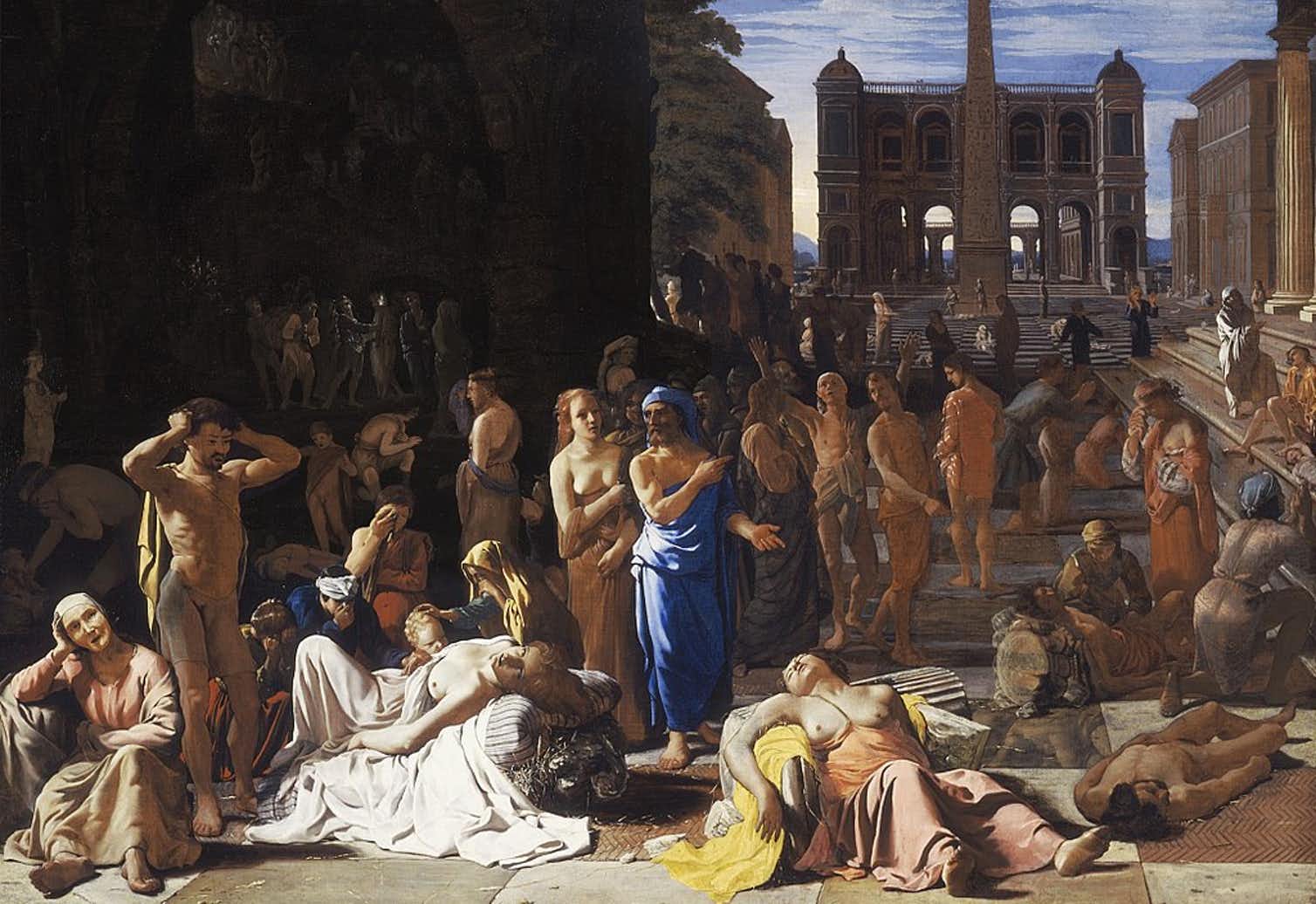History teaches us that epidemics are more like revelatory moments than social transformers, writes Pepe Escobar.
“The plague-stricken town, traversed throughout with hierarchy, surveillance, observation, writing; the town immobilized by the functioning of an extensive power that bears in a distinct way over all individual bodies – this is the utopia of the perfectly governed city.” – Michel Foucault, Discipline and Punish

Citizens of Tournai bury plague victims. Miniature from The Chronicles of Gilles Li Muisis (1272–1352). (Bibliothèque royale de Belgique)
By Pepe Escobar
in Bangkok
Asia Times
 Predictably eyeing the Decline and Fall of the American Empire, a serious academic debate is raging around the working hypothesis of historian Kyle Harper, according to whom viruses and pandemics – especially the Justinian plague in the 6th century – led to the end of the Roman Empire.
Predictably eyeing the Decline and Fall of the American Empire, a serious academic debate is raging around the working hypothesis of historian Kyle Harper, according to whom viruses and pandemics – especially the Justinian plague in the 6th century – led to the end of the Roman Empire.
Well, history actually teaches us that epidemics are more like revelatory moments than social transformers.
Patrick Boucheron, a crack historian and a professor at the esteemed College de France, offers a very interesting perspective. Incidentally, before the onset of Covid-19, he was about to start a seminar on the Black Death medieval plague.
Boucheron’s view of Boccaccio’s Decameron, written in 1350 and about young Florentine aristocrats who fled to the Tuscan countryside to tell stories, focuses on the plague’s character as a “horrible beginning” that tears apart social liaisons, provokes a funerary panic and has everyone wallowing in anomie.

The plague in Florence, 1348; illustrating Boccaccio’s Decameron.
19th century etching by Luigi Sabatelli (Wikimedia Commons)
Then he draws a historical parallel with Thucydides writing about the Athens plague in the summer of 430 BC. Pushing it to the limit, we may venture that Western literature actually starts with a plague – described in Book 1 of the Iliad by Homer.
Thucydides’ description of the Great Plague – actually typhoid fever – is a literary tour de force as well. In our current setting, that’s more relevant than the “Thucydides trap” controversy – as it’s idle to compare the context in ancient Athens with the current US-China hybrid war.
Both Socrates and Thucydides, incidentally, survived the plague. They were tough, and acquired immunity from their earlier exposure to typhoid. Pericles, the leading citizen of Athens, was not so lucky: he died at 66, a victim of the plague.
The City in Fear
Boucheron wrote an immensely interesting book, Conjurer la Peur (To Conjure Fear) telling the story of Siena a few years before the Black Death, in 1338. This is the Siena pictured by Ambrogio Lorenzetti in the walls of the Palazzo Pubblico – one of most spectacular allegorical frescoes in history.
In his book, Boucheron writes about political fear before it is engulfed by biological fear. Nothing could be more contemporary.
In Lorenzetti’s Allegory of Bad Government, the court of bad justice is governed by a devil holding a poisoned chalice (today that would be the “crowned poison” – or coronavirus). The devil’s eyes are crossed and one of his feet is over a goat’s horns. Floating above his head we find Avarice, Pride and Vainglory (match them with contemporary political “leaders”). War, Treason, and Fury sit to his left (the US Deep State?) and Discord, Fraud and Cruelty on his right (casino capitalist financialization?). Justice is bound, and her scales have fallen. Talk about an allegory of the “international community.”

Ambrogio Lorenzetti ‘s Allegory of Bad Government (1338), fresco in the town hall of Siena, Italy. (Photo Domain)
Boucheron pays special attention to the city as depicted by Lorenzetti. That’s the city at war – as opposed to the harmonious city in the Allegory of Good Government. The crucial point is that this is a depopulated city – much like our cities in quarantine now. Only men at arms are circulating and, as Boucheron tells it: “We guess that behind the walls, people are dying.” So this image has not changed today – deserted streets; quite a few elderly people dying in silence in their homes.
Boucheron then makes a startling connection with the frontispiece of Hobbes’s Leviathan, published in 1651: “Here again there is a city depopulated by an epidemic. We know because at the borders of the image we identify two silhouettes with birds’ beaks, which represent the doctors of the plague,” while the people in the city have been sucked upward, ballooning the figure of the Leviathan state monster who is very confident of the fear he inspires.
Boucheron’s conclusion is that the state is always capable of obtaining an absolutely unprecedented resignation and obedience from the population. “What’s complicated is that even if what everything we say about the society of surveillance is scary and true, the state obtains this obedience in the name of its most undisputed function, which is to protect the population from creeping death. That’s what plenty of serious studies define as ‘biolegitimacy’.”
And I would add, today, a biolegitimacy boosted by widespread voluntary servitude.
The Age of Haphophobia
Michel Foucault was arguably the premier modern cartographer of the Panopticon-derived surveillance society.
Then there’s Gilles Deleuze. In 1978, Foucault famously declared that, “perhaps, one day, this century will be called the Deleuzian century.”
Well, Deleuze is actually more 21st century than 20th. He went farther than anyone else studying societies of control – where control does not come from the center or from the top but flows through micro-vigilance, even activating the desire on everyone to be disciplined and monitored: once again, voluntary servitude.
Judith Butler, talking about South Africa-based critical theorist Achille Mbembe’s extraordinary Necropolitics, noted how he “continues where Foucault left off, tracking the lethal afterlife of sovereign power as it subjects whole populations to what Fanon called ‘the zone of non-being’.”
So a great deal of the intellectual debate ahead of us, borrowing from Fanon, Foucault, Deleuze, Mbembe and others, will necessarily have to focus on biopolitics and the widespread state of exception – which, as Giorgio Agamben has demonstrated, referring to Planet Lockdown, is now completely normalized.
We cannot even begin to imagine the consequences of the anthropological rupture caused by Covid-19. Sociologists for their part are already discussing how “social distancing” is an abstraction, defined and lived in quite unequal terms. They are discussing the reasons why the powers that be chose a martial vocabulary (“lockdown”) instead of forms of mobilization guided by a collective project.
And that will lead us to deeper studies of the Age of Haphophobia: our current condition of widespread fear of physical contact. Historians will be trying to analyze it in conjunction with how social phobias have evolved across centuries.
There’s no question that Foucault’s exhaustive mapping should be understood as a historical analysis of different techniques used by the powers that be to manage the life and death of populations. Between the crucial years 1975 and 1976, when he published Discipline and Punish (featured in this essay’s epigraph) and the first volume of History of Sexuality, Foucault, based on the notion of “biopolitics,” described the transition from a “sovereign society” to a “disciplinary society.”
His main conclusion is that techniques of biopolitical government spread out way beyond the legal and punitive spheres, and now are all over the spectrum, even lodged inside our individual bodies.
Covid-19 is presenting us with a huge biopolitical paradox. When the powers that be act like they are protecting us from a dangerous disease, they are imprinting their own immunity-based definition of the community. At the same time they have the power to decide to sacrifice part of the community (elderly people left to die; victims of the economic crisis) to the benefit of their own idea of sovereignty.
The state of exception to which many parts of the world are subjected now represents the normalization of this unbearable paradox.
House Arrest
So how would Foucault see Covid-19? He would say that this epidemic radicalizes biopolitical techniques applied to a national territory, and inscribes them in a political anatomy applied to each individual body. That’s how an epidemic extends to the whole population political measures of “immunization” that previously only applied – violently – to those that were considered “aliens,” inside and outside the national, sovereign territory.
It’s irrelevant whether Sars-Covid-2 is organic; a bioweapon; or, CIA conspiracy theory-style, part of a world domination plan. What’s happening in real life is that the virus reproduces, materializes, extends and intensifies – for hundreds of millions of people – dominant forms of biopolitical and necropolitical management that were already in place. The virus is our mirror. We are what the epidemic says we are, and how we decide to face it.
And under such extreme turbulence, as noted by philosopher Paul Preciado, we end up reaching a new necropolitical frontier – especially in the West.
The new territory of the border politics the West has been testing for years over “The Other” – blacks, Muslims, the poor – now starts at home. It’s as if Lesbos, the key entrance island for refugees in the Eastern Mediterranean coming from Turkey, now started at the entrance of each Western apartment.
With pervasive social distancing in place, the new border is each and everyone’s skin. Migrants and refugees were previously considered viruses, and only merited confinement and immobilization. But now these policies apply to whole populations. Detention centers – perpetual waiting rooms that abolish human rights and citizenship – are now detention centers inside one’s own home.
No wonder the liberal West has been plunged into a state of shock and awe.
Pepe Escobar, a veteran Brazilian journalist, is the correspondent-at-large for Hong Kong-based Asia Times. His latest book is “2030.” Follow him on Facebook.
The views expressed are solely those of the author and may or may not reflect those of Consortium News.
Please Donate to Consortium News.




Mr. Escobar is one if the finest writers around. Pulitzer quality work. This line, “With pervasive social distancing in place, the new border is each and everyone’s skin,” for some reason, made me think of a lecture given by Chalmers Johnson in Washington D.C. before 9/11 on the subject of his book, Blowback, regarding the excesses and consequences of empire. Prescient. youtu (dot) be/kJIT4F-H4Bo
Foucault died from AIDS early on in the pandemic. Bath houses were still open or only recently closed. The transmission of the disease was not fully known, nor about who was at risk. The state did intervene to some extent, but they were slow and not very helpful. Communities learned to deal with the disease itself and modified behavior in various ways. Choices about life-style, protected or unprotected sex, multiple partners, anonymous sex, love, community support, grief, loss, making the most of life, etc. were made by individuals and communities well in front and in excess of state policies. The benefits of surveillance and monitoring was not about deepening cruelty or control – the pre-modern king was thoroughly versed in the torture and execution of rivals (as was the church) – the attempt was to bring some furtherance to humanist tendencies of the culture. That these have not led to the exclusion of cruelty or repression is not the point, that we have in place methods for action that need not be taken with ignorance or cruel pageantry (but of course ignorance and cruelty still flourish).
It’s what we do with ourselves and the world we have constituted. Having methods of disciplined control by the community can be democratic and move us to higher ways of living – the community responses to AIDS made for tremendous gains in alternatives in community health, in sexual practices, in solidarity, in owning ourselves. I think Foucault would have been impressed by some of what he sadly failed to live to see.
I might disagree that plagues are not transformative socially and culturally, even politically. The US capitol was moved to Foggy Bottom due to repeated, severe outbreaks of Yellow Fever; Hamilton got it and almost died, while Washington and Jefferson ran for the hills. More importantly, Mardi Gras was basically stolen by New Orleans after the horrific yellow fever epidemic there in 1878. But there is no question his early point-that appeals to “the common safety”-not just the common GOOD, but a direct defense against a definable enemy or disease-legitimizes excesses of government power in the eyes of the average citizen in a way no other function can match. One of the most important ways humans form groups is one formed in the face of a shared, common threat. This is so intuitive as to be considered instinctive. You may fight with the other Neanderthals, but not when the dire-wolves are attacking all of you; you’ll fight together if you know what’s good for you, In this situation the government is suddenly viewed by the staunchest libertarian as their savior-as they should be. Unfortunately the government always seems to take the advantage to gain more power.
Thank you Mr Escobar for this depressing overview of our present and likely future reality.
Actually I had read something not overly dissimilar on WSWS. I am specifically referring to this statement you have written: “When the powers that be act like they are protecting us from a dangerous disease, they are imprinting their own immunity-based definition of the community. At the same time they have the power to decide to sacrifice part of the community (elderly people left to die; victims of the economic crisis) to the benefit of their own idea of sovereignty.”
An article – also on WSWS – few days ago revealed the open declaration of this view (that the British elderly be allowed to die off – they won’t need the NHS or their state pensions) remarked by a Daily Telegraph reporter/editor. Today’s article made clear that this is also the view of the IMF (regarding the UK, certainly).
My response was: “Not [surprised] by either the view, as the article makes clear is the IMF’s (thus the corporate-capitalist-imperialist-plutocratic) position that working class people (not the bourgeoisie, of course, nor the ultra wealthy) should die once their “useful” years are up, or that those working class elderly be forced to pay for the treatment of much younger people for COVID-19. Meanwhile, the obscenely wealthy to continues to not be required to contribute at all to the costs of the NHS (or other remaining public service) at any point because they offshore their monies and have for decades, thereby avoiding all taxation, even as they enjoy the benefits. BoJo, for example, didn’t stick his hands into his own pockets to pay for his treatment in a private hospital; no, the working classes’ taxes paid for that.
Throughout their working lives, the elderly paid into the fund that supports the state pension. They have earned every measly penny they receive once they retire or can retire. And given that such as Germany, France, Holland and so on can afford to pay out more in old age pensions, one has to ask why the Brit government can’t. Well, it’s been unwilling to, certainly since Thatcher the Snatcher came to power. Almost certainly the Tories had to be dragged along to agree with such a pension in the first place, but like the NHS it became popular with the working to lower middle class Tory party supporters so couldn’t be full-frontally eradicated.
I was going to rhetorically ask why anyone of the working classes (especially since Thatcher) would vote Tory – but then I realized that the Labour Party from Neil Kinnock on is no better (Thatcher considered Blair her protege) and the Liberal Dems just as bad. Just as in the US, there is no really existing difference among the parties except for a different colored lipstick painted here or there.”
Of course, the ultra wealthy 10%ers here in the USA aren’t bothered, either, about having to personally stump up any (let alone more) taxes to support the (health and general) care of the elderly, maintain their Social Security. Mind you neither “party” has minded, from Clinton’s presidency on, digging into the Social Security fund whenever they wanted to, for things other than Social Security, depleting it drastically. And both faces of the single party have sought to reduce Social Security, one way or another. As if the recipients haven’t paid into the funding for both Medicare and Social Security – and Medicare ain’t free to the recipient. So the extirpation of the elderly, poor and homeless – useful. Then the handful of programs providing some support, some care can be eradicated completely. And taxation of the remaining, working class workforce – subcontracted, temporary, part-time as it increasingly is – will continue to enable the plutocratic corporate-capitalist-imperialists to both avoid paying any taxes themselves and maintain all aspects of the MIC.
“I was going to rhetorically ask why anyone of the working classes (especially since Thatcher) would vote Tory ”
Gambling and “magical thinking” are popular in times of trouble often thought to be the only games in town, obfuscating the high probability that the “house” always wins.
Amoung the whys are included but not limited to – Things can only get betterness” – sometimes known as hope encouraged by the discouragement of thought and/or the hope/thought conflation, stress and variable tempo.
The encouragement of hope is an important tool in manipulation as evangelised in the Trawniki papers, facilitating the increased productivity of Chelmno, Belzec, Sobibor and Treblinka and other enterprises reliant on fear of the “other”.
“Throughout their working lives, the elderly paid into the fund that supports the state pension.”
Some thought and still think that “National Health Insurance” was/is an annuity and that the funds were “ring fenced”, where as it is a tax like others contributing to funding general “expenses”.
“And given that such as Germany, France, Holland and so on can afford to pay out more in old age pensions, one has to ask why the Brit government can’t.”
The cloak of can’t is often the chosen dressing of won’t, which is sometimes rendered necessary by some assay of can’t.
Perhaps “one has to ask why the Brit government can’t and/or won’t” will prove more illuminating since outcomes are often functions of framing ?
Absolutely superb re-collection of many aspects of this age of revelation, which began even before 911, even before off-shoring, in fact in the waning months of WW II. The main driver has been U$ military/political-economic domination, globally, in conjunction with a domestic program of learned helplessness (how vary apt that Mitchell and Jesson used that as the name of the torture program they developed for the Lesser Bush regime) through inculcated myth and education systematically reduced from encouraging at least some interest in critical thought, to the viciously anti-intellectual drive of schooling not simply reduced to occupational training of replacement cogs with a wee bit of social and economic “meritocracy” attached to the best and brightest, but also to enforcing discipline as prime objective for those deemed to be merely the drones who, as this pandemic has made clear, not only are the only members of society who actually build, repair, and transport things, but also grow, deliver, and man the checkout counters which provide us our daily bread.
The truly redundant, the actually “deplorable”, are the entirety of the political, financial, corporate, and military elite, all of whom contribute nothing of actual value and who ruthlessly extract, from people and planet, plunder called “profit” and are, the lot of them, revealed as being far less useful to the rest of us than a roll of toilet paper.
I do hope this article, which may well be one of the very best which Pepe Escobar, who consistently writes at a level of sense and comprehension which quite place him in a league of his own, might serve to spark conversations and thought experiments which we human beings are in most seriously desperate need of, at this time, when any new “normal”, as envisioned by the kakistocratic elite, will be very nasty and brutish indeed.
May we see, in the days, weeks, and months ahead, evidence of a new, more mature, consciousness among the many emerge from the idiotic Russia and China bashing rhetoric of the political Overton Window, that new visions of a sane, humane, and sustainable global humanity might be articulated, might discussed, examined, agreed upon and brought into being.
Revelation of the sort Pepe Escobar has deftly outlined, if it is not to be useless, must engender the social change which is obviously most critically necessary if extinction is to be knowingly and intentionally avoided.
Frankly, I do not expect the U$ or most of the so-called “west”, to play a significant role, initially, in developing either narratives, courage, or conscience, as more vapulation may well be required before revolutionary morale, in those exceptional places, may be ignited, understood as necessary, and enthusiastically embraced.
We are plagued to live in interesting times, at least as a wake-up call for those not yet aware and still childishly wedded to absurd notions that any kind of effective electoral solution to enforced social catastrophe is either possible or permitted.
Cherished your comments as much as the article. Can you please share books or blogs that I should be reading?
Thank you
Fascinating stuff from Pepe, as always. Don’t know if he’ll see this, but interesting that you mention Judith Butler. Her donation(s) to the Kamala Harris campaign mean she is probably enjoying the extreme voluntary servitude and licking her chops at the prospect of Harris being VP.